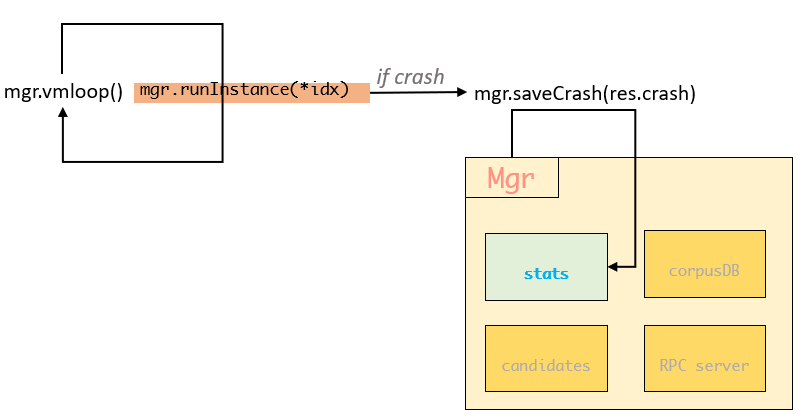How does Syz-manager synchronize statistics information with fuzzers?
How does Syz-manager gets crashes, total execution times, … , during the fuzzing process?
Manager uses integer Stat as info unit and defines the following methods:
type Stat uint64
func (s *Stat) get() uint64 {
return atomic.LoadUint64((*uint64)(s))
}
func (s *Stat) inc() {
s.add(1)
}
func (s *Stat) add(v int) {
atomic.AddUint64((*uint64)(s), uint64(v))
}
func (s *Stat) set(v int) {
atomic.StoreUint64((*uint64)(s), uint64(v))
}Manager mantains the Stats representing the statistics info:
type Stats struct {
crashes Stat
crashTypes Stat
crashSuppressed Stat
vmRestarts Stat
newInputs Stat
rotatedInputs Stat
execTotal Stat
hubSendProgAdd Stat
hubSendProgDel Stat
hubSendRepro Stat
hubRecvProg Stat
hubRecvProgDrop Stat
hubRecvRepro Stat
hubRecvReproDrop Stat
corpusCover Stat
corpusCoverFiltered Stat
corpusSignal Stat
maxSignal Stat
mu sync.Mutex
namedStats map[string]uint64
haveHub bool
}When starting the manager, a goroutine will be set:
//manager.go:RunManager()
go func() {
for lastTime := time.Now(); ; {
time.Sleep(10 * time.Second)
now := time.Now()
diff := now.Sub(lastTime)
lastTime = now
mgr.mu.Lock()
if mgr.firstConnect.IsZero() {
mgr.mu.Unlock()
continue
}
mgr.fuzzingTime += diff * time.Duration(atomic.LoadUint32(&mgr.numFuzzing))
executed := mgr.stats.execTotal.get()
crashes := mgr.stats.crashes.get()
corpusCover := mgr.stats.corpusCover.get()
corpusSignal := mgr.stats.corpusSignal.get()
maxSignal := mgr.stats.maxSignal.get()
triageQLen := len(mgr.candidates)
mgr.mu.Unlock()
numReproducing := atomic.LoadUint32(&mgr.numReproducing)
numFuzzing := atomic.LoadUint32(&mgr.numFuzzing)
log.Logf(0, "VMs %v, executed %v, cover %v, signal %v/%v, crashes %v, repro %v, triageQLen %v",
numFuzzing, executed, corpusCover, corpusSignal, maxSignal, crashes, numReproducing, triageQLen)
}
}()This code snippet gets the current time, loads the info and prints them every 10 seconds.
Total Execution
mergeNamed incorporates the input map into mgr.Stats:
func (stats *Stats) mergeNamed(named map[string]uint64) {
stats.mu.Lock()
defer stats.mu.Unlock()
if stats.namedStats == nil {
stats.namedStats = make(map[string]uint64)
}
for k, v := range named {
switch k {
// Add the exec total
case "exec total":
stats.execTotal.add(int(v))
default:
stats.namedStats[k] += v
}
}
}This function is invoked within the Poll function:
func (serv *RPCServer) Poll(a *rpctype.PollArgs, r *rpctype.PollRes) error {
serv.stats.mergeNamed(a.Stats)
serv.mu.Lock()
defer serv.mu.Unlock()
...
}Fuzzers collect all proc.env.StatExecs, add them together and send them to manager through RPC:Poll() in function poll().

proc.env.StatExecs is updated in function proc.env.Exec:
// Exec starts executor binary to execute program p and returns information about the execution:
// output: process output
// info: per-call info
// hanged: program hanged and was killed
// err0: failed to start the process or bug in executor itself.
func (env *Env) Exec(opts *ExecOpts, p *prog.Prog) (output []byte, info *ProgInfo, hanged bool, err0 error) {
//...
atomic.AddUint64(&env.StatExecs, 1)
//...
}
Crashes
Getting crashes is from the return results of mgr.runInstance() which start the VM and run syz-fuzzer in it. Since syz-fuzzer itself runs in an infinite loop, the termination of the mgr.runInstance() is most likely due to a crash.
func (mgr *Manager) vmLoop() {
log.Logf(0, "booting test machines...")
log.Logf(0, "wait for the connection from test machine...")
//...
runDone := make(chan *RunResult, 1)
//...
for shutdown != nil || instances.Len() != vmCount {
// ...
if shutdown != nil {
// ...
for !canRepro() {
// ...
log.Logf(1, "loop: starting instance %v", *idx)
// 开始fuzzing
go func() {
// 运行第idx个VM, 返回结果,如果crash不为nil则表明发生崩溃
crash, err := mgr.runInstance(*idx)
runDone <- &RunResult{*idx, crash, err}
}()
}
}
//...
wait:
select {
// ...
// 产生了crash
case res := <-runDone:
log.Logf(1, "loop: instance %v finished, crash=%v", res.idx, res.crash != nil)
if res.err != nil && shutdown != nil {
log.Logf(0, "%v", res.err)
}
stopPending = false
instances.Put(res.idx)
// On shutdown qemu crashes with "qemu: terminating on signal 2",
// which we detect as "lost connection". Don't save that as crash.
if shutdown != nil && res.crash != nil {
needRepro := mgr.saveCrash(res.crash)
// ...
}
//...
}
}
}
References
- How to log msg in syz-fuzzer: https://groups.google.com/g/syzkaller/c/CKcFAS1Z_jY
